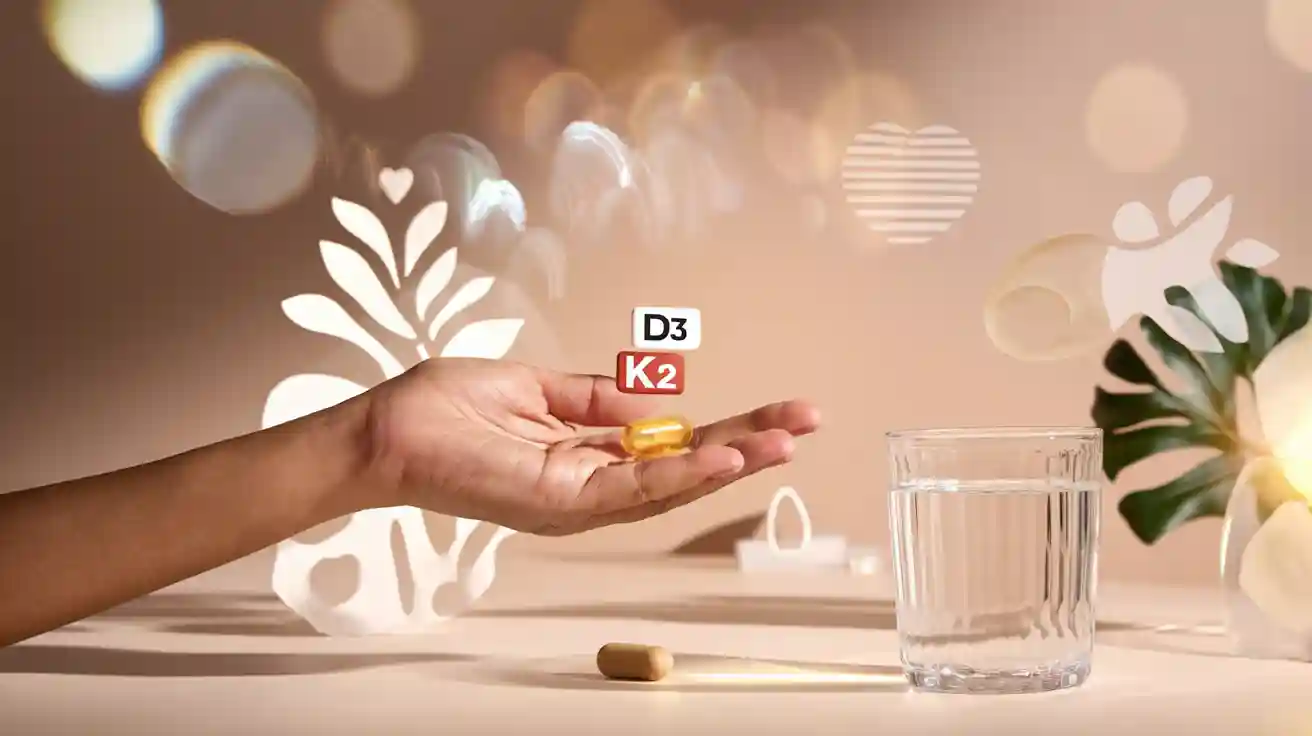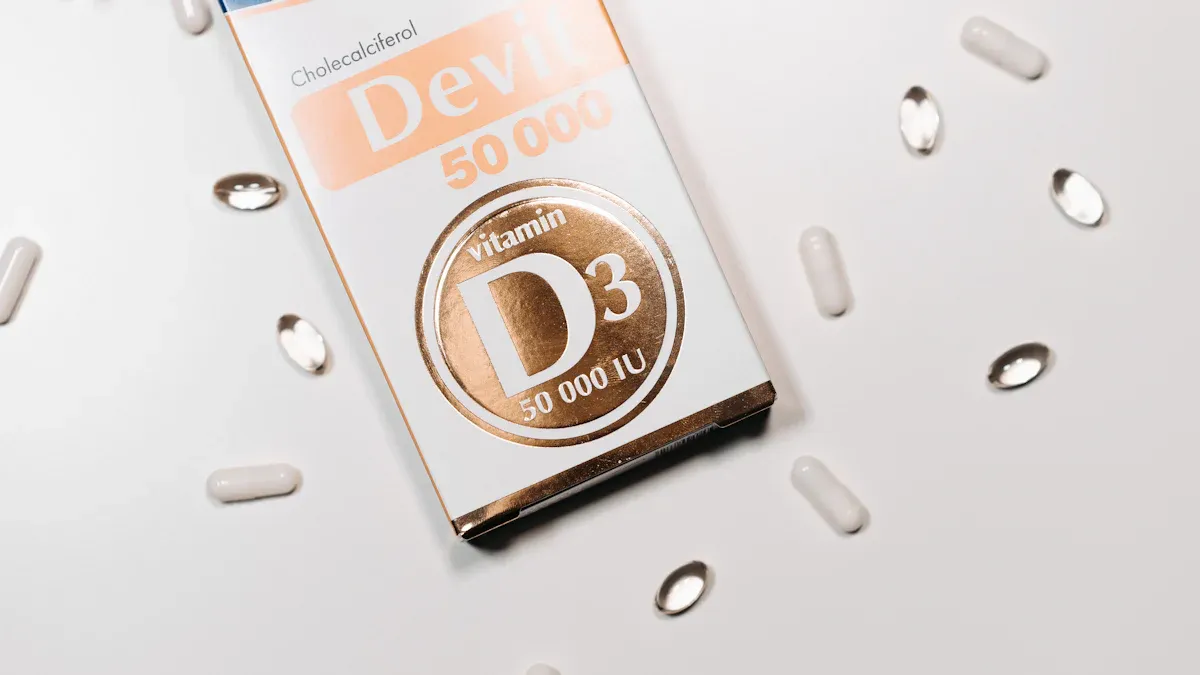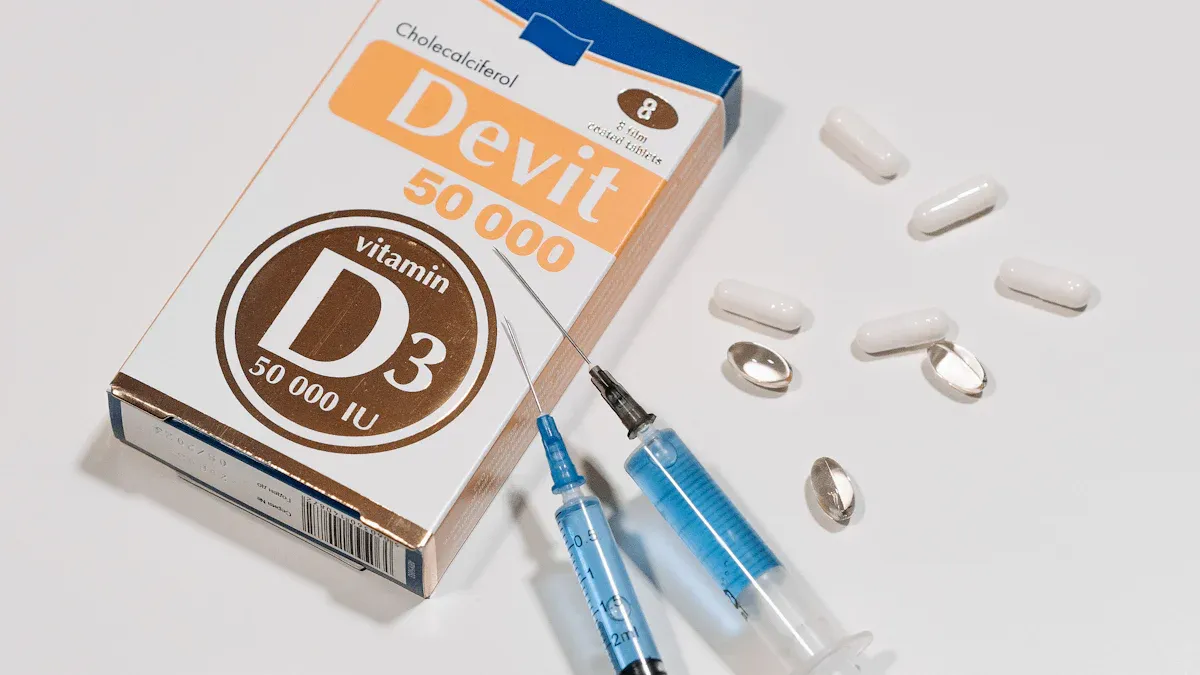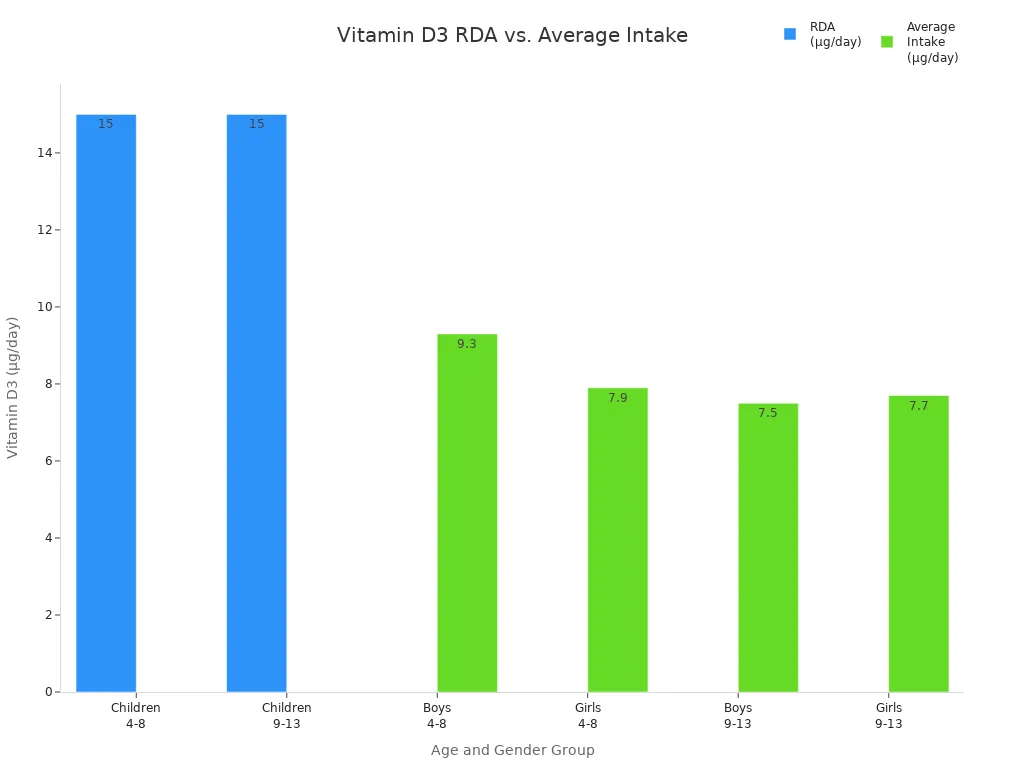Vitamin D3 and K2: Why You Need Both for Wellness
Table of Contents

You might think popping a single vitamin is enough for strong bones or a healthy heart, but it’s not that simple. Many people miss that vitamin d3 and k2 work best together. When you take them as a team, you unlock real synergy. K2 helps guide calcium to your bones and teeth, while D3 boosts your body’s ability to use it. Without this combo, you risk calcium ending up where it shouldn’t—like in your arteries. Did you know over 40% of people don’t get enough D3? Rates are even higher for people of color and those living in the Middle East. That’s why getting the right balance matters for your health.
Vitamin D3 Benefits

Bone Health
You want stronger bones, right? Vitamin d3 helps your body absorb calcium, which is the main building block for your bones. When you get enough vitamin d3, you give your body the tools it needs to promote bone health. A large review found that people who took vitamin d3 had better bone mineral density, especially in the lower back and hip area. The more vitamin d3 you get, the more your bones benefit. This is important because low levels can lead to osteoporosis, a condition where bones become weak and break easily.
Did you know?
Vitamin d3 helps your body use calcium and phosphorus. These minerals are key for bone growth and repair.
Here’s a quick look at how vitamin d3 works for your bones:
| Role | Description |
|---|---|
| Calcium Absorption | Helps your gut take in more calcium and phosphorus for bone strength |
| Bone Remodeling | Supports the cells that build and break down bone, keeping bones healthy |
Immune Support
Vitamin d3 does more than help your bones. It also supports your immune system. When your vitamin d3 levels are good, your body can fight off germs better. Studies show that people with low vitamin d3 get sick more often, especially with colds and other respiratory infections. Kids, older adults, and people with health problems need to pay extra attention to their vitamin d3 levels.
| Study Model | Findings | Mechanism |
|---|---|---|
| Mouse Models | Lower rates of autoimmune diseases | Boosts immune response and balances immune cells |
| Human Studies | Fewer respiratory infections with good levels | Helps your body defend against viruses and bacteria |
Mood Enhancement
Ever notice you feel down during the winter? That might be because you’re not getting enough vitamin d3. Research shows that people with higher vitamin d3 levels often have a better mood. One study found that pregnant women who took vitamin d3 felt less depressed. Another review showed that older adults with more vitamin d3 in their blood had fewer symptoms of depression.
- A meta-analysis found that people with higher vitamin d3 levels had better mood scores.
- Studies with better designs showed stronger links between vitamin d3 and feeling happier.
Getting enough vitamin d3 can help you feel better, both in your body and your mind.
Vitamin K2 Benefits
Bone Strength
You want strong bones that last a lifetime. Vitamin k2 helps you get there. It acts like a helper for special bone proteins. These proteins need vitamin k2 to work right. When they do, your bones can grab and hold onto calcium better. Here’s how vitamin k2 supports your bone health:
- It helps bone proteins like osteocalcin bind to minerals, making bones stronger.
- It encourages bone marrow stem cells to become bone-building cells, not fat cells.
- It keeps bone-building cells alive longer, so you get more healthy bone tissue.
- It slows down cells that break down bone, which helps keep your bones dense.
Researchers have found that taking vitamin k2 can boost bone mineral density. Some studies even show that it lowers your risk of breaking a bone, especially in older adults. One review found that people who took vitamin k2 had up to 80% fewer hip fractures. That’s a big deal for your health and independence.
Heart Protection
Your heart works hard every day. You want to keep it strong and healthy. Vitamin k2 helps by keeping calcium out of places it shouldn’t be—like your arteries. When calcium builds up in your blood vessels, it can make them stiff and raise your risk of heart problems. Vitamin k2 activates a protein called MGP. This protein sweeps calcium away from your arteries and soft tissues, protecting your heart.
Let’s look at what studies say about vitamin k2 and heart health:
| Study Name | Main Finding |
|---|---|
| Danish Diet Cancer and Health Study | 14% lower risk of heart disease with more vitamin k2 |
| Prospect-EPIC cohort | 9% lower risk of heart problems for every 10 μg/day increase in vitamin k2 |
| Rotterdam Study | 41% lower risk of heart disease in people with the most vitamin k2 |
| Vissers et al. | Less risk of artery disease with higher vitamin k2 intake |
Getting enough vitamin k2 means you’re helping your heart by reducing calcification risk and keeping your arteries flexible.
Calcium Regulation
You need calcium for strong bones and a healthy heart, but it has to go to the right places. Vitamin k2 acts like a traffic cop for calcium. It guides calcium into your bones and teeth and keeps it out of your arteries and organs. This helps you avoid problems like hard arteries or kidney stones.
- Vitamin k2 directs calcium to bones, not blood vessels.
- It helps activate proteins that control where calcium goes.
- It keeps your bones strong and your heart safe by reducing calcium buildup in soft tissues.
When you get enough vitamin k2, you help your body use calcium the right way. This means stronger bones and a healthier heart for you.
D3 and K2 Synergy

Calcium Metabolism
You want your body to use calcium the right way. That’s where vitamin d3 and k2 come in as a powerful team. Vitamin d3 helps your gut pull more calcium from your food. This is called enhanced absorption. But that’s only half the job. Vitamin k2 steps in and makes sure the calcium goes to your bones and teeth, not your arteries or organs. You get the best results when both vitamins work together.
Here’s a simple look at how each vitamin helps with calcium:
| Vitamin D3 Role | Vitamin K2 Role |
|---|---|
| Promotes calcium absorption in the gut | Directs calcium into bones and away from blood vessels |
| Ensures calcium enters the bloodstream | Helps maintain bone strength and structure |
| Produces proteins that require vitamin K2 | Supports cardiovascular health by preventing calcium buildup in arteries |
Several studies show this teamwork in action. For example, Møller and colleagues found that vitamin k2 increased the good form of a bone protein and lowered the bad form. Zhou’s research showed that vitamin k2 helps keep bones strong and lowers the risk of fractures in women after menopause. When you take vitamin d3 and k2 together, you help your body use calcium better and keep it where it belongs.
Bone and Heart Health
You want strong bones and a healthy heart. Vitamin d3 and k2 make that possible. Vitamin d3 gets calcium into your blood, but vitamin k2 is the one directing calcium to bones. Without k2, calcium can end up in your arteries, which is not good for your heart.
Let’s see what the science says:
| Study | Findings |
|---|---|
| Matsunaga et al. | D3 and K2 together reduce bone loss in animal studies |
| Combined therapy study | D3 and K2 group had higher bone fusion rates than control |
| Ravindra et al. | D3 alone had limited effects; the combo with K2 worked better |
| Postmenopausal Health Study II | Only the combination of D and K increased spine bone mineral density |
| Multiple human trials | D3 and K2 together reduce bone loss more than either alone |
You get more than just strong bones. Research shows that combining vitamin d3 and k2 may lower your risk of heart disease. This combo can reduce artery stiffness and help keep your blood vessels flexible. One study even found that people with low levels of both vitamins had more heart problems and a higher risk of dying from any cause. When you use both vitamins, you give your bones and heart the best chance to stay healthy.
Enhanced Wellness
You want to feel your best every day. Vitamin d3 and k2 can help you get there. When you take both, you support your bones, your heart, and even your immune system. Studies show that this pair works better together than alone. For example, one study found that only the group taking both vitamins saw real gains in bone strength. Other research shows that vitamin d3 and k2 together can lower your risk of heart disease more than just taking vitamin d3.
Here are some ways this combo boosts your wellness:
- Keeps your bones strong and less likely to break
- Protects your heart by stopping calcium from building up in arteries
- Supports your immune system so you get sick less often
Tip:
If you want the most from your supplements, look for products that combine vitamin d3 and k2. This way, you get the benefits of enhanced absorption and better calcium use.
Many experts say that vitamin d3 and k2 are one of the best pairs for wellness. They work together to help your body use calcium the right way, which is something other nutrients can’t do as well. When you choose this combo, you give your body the tools it needs for strong bones, a healthy heart, and better overall health.
Who Needs Vitamin D3 and K2
At-Risk Groups
You might wonder if you need extra vitamin d3 and K2. Some groups have a higher chance of missing out. If you belong to one of these, you should pay close attention:
- African-American adults have the highest rates of vitamin d deficiency, reaching over 80%.
- Hispanic adults also face a big risk, with more than 60% showing low levels.
- People with obesity, diabetes, or poor health often struggle to get enough.
- Smokers and those who skip milk or lack a college education may also fall short.
If you have limited sun exposure, you might need more vitamin d3. Pregnant and breastfeeding women, people with low bone density, and those with certain health conditions should consider their intake, too.
Lifestyle Factors
Your daily habits play a huge role in your vitamin levels. What you eat, how much you move, and how often you get outside all matter. Take a look at this table to see how lifestyle choices affect your vitamin d3 status:
| Lifestyle Factor | Impact on Vitamin D Status |
|---|---|
| High Carbohydrate Diet | Can lower vitamin d levels and make deficiency more likely |
| Sun Exposure | Helps your body make vitamin d3; not enough sunlight can lead to low levels |
| Dietary Sources | Eating a healthy diet with foods rich in vitamins d3 and K2 supports better levels |
| Environmental Toxins | Pollution and chemicals can block vitamin d activation |
| Ultra-Processed Foods | Diets high in these foods often lack important vitamins |
Getting 10 to 15 minutes of sunlight a few times a week helps boost your vitamin d3. If you live in a place with lots of pollution or cloudy weather, you may need to work harder to keep your levels up.
Age Considerations
As you get older, your body changes. You might find it harder to make or absorb vitamin d3 and K2. Older adults often spend less time outside, which lowers their vitamin d3. Chronic diseases and some medicines can also make it tough for your body to use these vitamins. Low levels link to bone and heart problems, especially in seniors and menopausal women. Keeping up with a healthy diet or taking supplements can help you stay strong and active as you age.
Tip: If you’re over 65, talk to your doctor about checking your vitamin d3 and K2 levels. Staying ahead can help you avoid bone loss and heart issues.
Safe Supplementation
Dosage Tips
You want to get the most from your vitamin D3 and K2 supplement. The right dose matters for your health. Most experts suggest 600 IU of vitamin D3 each day for children ages 4 to 13. That equals about 15 micrograms. Many kids do not reach this amount. Take a look at the table below to see how much children usually get compared to what they need.
| Age Group | Vitamin D3 RDA (IU/day) | Vitamin D3 RDA (μg/day) |
|---|---|---|
| Children (4-8) | 600 | 15 |
| Children (9-13) | 600 | 15 |
| Average intake (Boys, 4-8) | 372 | 9.3 |
| Average intake (Girls, 4-8) | 316 | 7.9 |
| Average intake (Boys, 9-13) | 300 | 7.5 |
| Average intake (Girls, 9-13) | 308 | 7.7 |

If you take too much vitamin D3, you might feel muscle pain, mood changes, or stomach aches. Some people get kidney stones or feel confused. Too much vitamin K2 can cause problems if you take blood thinners. Watch for signs like nausea, tiredness, or bone pain. Always check the label on your supplement and follow the directions.
Choosing Quality
Picking the right supplement helps you stay safe and healthy. Look for supplements that have third-party testing. This means another company checks the product for quality. Choose supplements with bioavailable forms of vitamin D3 and K2. These types work better in your body. If you see a seal from a trusted group, that is a good sign. You want a supplement that gives you what it promises.
Note:
If you take medicine for your heart or blood, talk to your doctor before starting any new supplement.
Pairing Advice
You can boost the power of your supplements with a few easy steps. Take your vitamin D3 and K2 supplement with a meal that has healthy fats. Foods like eggs, avocado, or nuts help your body absorb these vitamins. Try to take your supplement in the morning or early afternoon. This matches your body’s natural rhythm and can help you feel more energy. Make a habit of taking your supplements at the same time each day. Staying consistent helps you get the best results.
Tip:
Always ask your healthcare provider before you start a new supplement, especially if you have health problems or take other medicines.
You want strong bones and a healthy heart. Taking vitamin D3 and K2 together gives you both. Here’s why this combo matters:
- Vitamin D3 helps your body absorb calcium for bone strength.
- Vitamin K2 guides calcium to your bones and teeth, not your arteries.
- Using both supports your heart and keeps your bones healthy over time.
- Studies show this combo is safe and well-tolerated.
To get the most from your supplements, try these steps:
- Take them with a meal that has healthy fats.
- Stick to a morning routine for best results.
- Stay consistent every day.
Talk with your doctor before starting any new supplement, especially if you have health concerns. Your wellness starts with smart choices!
FAQ
Can I take vitamin D3 without K2?
You can, but you might not get the best results. Vitamin K2 helps guide calcium to your bones and teeth. Without K2, calcium could end up in your arteries. For strong bones and a healthy heart, take both together.
What foods have vitamin K2?
You find vitamin K2 in foods like natto (fermented soybeans), hard cheeses, egg yolks, and chicken. Natto has the highest amount. Most people do not eat enough of these foods, so supplements can help.
How do I know if I need more vitamin D3 or K2?
You might feel tired, get sick often, or have weak bones. Your doctor can check your vitamin levels with a blood test. If you stay indoors a lot or eat few dairy foods, you may need more.
Are there side effects from taking D3 and K2?
Most people do not have problems when they follow the recommended dose. Taking too much can cause nausea, headaches, or stomach pain. Always read the label and talk to your doctor if you have health concerns.

Poseidon
Master of Nutritional Epidemiology, University of Copenhagen, Herbal Functional Nutrition Researcher
Focus: The scientific application of natural active ingredients such as Tongo Ali, Horny Goat Weed, and Maca to sexual health and metabolic regulation.
Core Focus:
Men: Use a combination of Tongo Ali (an energizing factor) + Maca (an energy reserve) to improve low energy and fluctuating libido.
Women: Use a combination of Horny Goat Weed (a gentle regulator) + Maca (a nutritional synergist) to alleviate low libido and hormonal imbalances.
Stressed/Middle-Aged Adults: This triple-ingredient synergy supports metabolism, physical strength, and intimacy.
Product Concept:
Based on traditional applications and modern research (e.g., Tongo Ali promotes testosterone-enhancing enzyme activity, and icariin provides gentle regulation), we preserve core active ingredients and eschew conceptual packaging—using natural ingredients to address specific needs.
Simply put: I'm a nutritionist who understands "herbal actives." I use scientifically proven ingredients like Tongo Ali, Epimedium, and Maca to help you make "sexual health" and "nutritional support" a daily routine.
